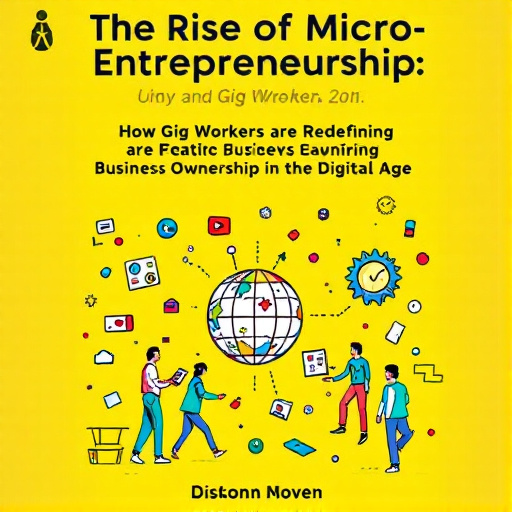Featured Articles
- 7 Best AI-Powered Marketing Platforms Released Since 2019 That Will Supercharge Your Startup Growth
- 9 Proven Psychological Tricks Entrepreneurs Use to Influence Buyers and Skyrocket Sales
- "From Side Hustle to Mainstream: The Surprising Rise of Entrepreneurial Niche Communities"
- The Rise of 'Accidental Entrepreneurs': How Unexpected Events Spark New Business Ventures
- The Rise of Eco-Entrepreneurship: How Green Startups Are Transforming Traditional Industries
The Rise of 'Accidental Entrepreneurs': How Unexpected Events Spark New Business Ventures
The Rise of 'Accidental Entrepreneurs': How Unexpected Events Spark New Business Ventures
The phenomenon of 'accidental entrepreneurs' showcases how unexpected events, such as job loss or personal challenges, can lead individuals to start successful businesses they might never have considered. This article explores the stories, statistics, and motivations behind this rising trend, illuminating the unpredictability of entrepreneurship in today's world.
The Accidental Entrepreneur: A New Breed of Business Visionary
From tech giants like Microsoft to local artisanal shops, the landscape of entrepreneurship has changed significantly. Sometimes, the spark of innovation comes from a need rather than a desire. This trend has given rise to a new breed of entrepreneur: the accidental entrepreneur.
What is an Accidental Entrepreneur?
Accidental entrepreneurs are individuals who find themselves in the business world due to unforeseen circumstances—be it a layoff, a personal passion ignited by necessity, or an unexpected opportunity. Unlike traditional entrepreneurs who plan and prepare meticulously, accidental entrepreneurs often dive in headfirst, driven by passion and necessity rather than strategy. For example, a 30-year-old school teacher might lose her job and, rather than seeking another position, decides to turn her gourmet cupcake hobby into a thriving bakery.
Statistics that Speak Volumes
According to a study by the Kauffman Foundation, nearly 70% of entrepreneurs reported that they started their businesses due to personal circumstances, rather than a calculated business plan (Kauffman Foundation, 2020). This statistic underscores the shift in the modern entrepreneurial spirit where necessity can trump traditional planning.
Real-Life Stories: From Job Loss to Business Success
Consider the story of Sarah Adams, a former corporate lawyer who, after being laid off during a financial downturn, channeled her energy into creating a nonprofit organization that provides free legal services to low-income families. What began as a passionate response to her newfound freedom became a full-fledged venture that now serves thousands annually. Sarah's story is illustrative of many who transformed setbacks into steppingstones.
Then there’s John Smith, a 45-year-old who turned his unexpected retirement into an opportunity to launch a unique online platform connecting retirees with part-time job opportunities. Frustrated by his inability to find fulfilling work post-retirement, he saw a gap in the market—a problem he could solve utilizing his legal expertise. Today, John's platform boasts over 10,000 users in its first year alone.
Why the Workspace Culture is Changing
The rise of remote work, gig economies, and a shift in personal values have contributed to this trend. In a survey conducted by the Global Entrepreneurship Monitor, over 54% of respondents stated that flexible work arrangements influence their career choices (GEM, 2021). With the pandemic reshaping how we view work-life balance, many individuals are re-evaluating their career paths, leading to an increase in accidental entrepreneurship.
Cultivating a Mindset of Resilience
Perhaps the most significant trait of an accidental entrepreneur is resilience. Starting a business—especially unexpectedly—can be fraught with challenges. Sarah and John faced numerous hurdles, from securing funding to building a customer base. But it’s their capacity to adapt and evolve that brought them success. A study from Harvard found that resilience is a critical factor in entrepreneurial success, with resilient entrepreneurs being more likely to persist through tough times (Harvard Business Review, 2021).
Social Media: A Double-Edged Sword
Accidental entrepreneurs are often savvy in leveraging social media to promote their ventures. Platforms like Instagram and Facebook make it possible to reach potential customers at a fraction of the cost of traditional marketing. For instance, Sarah utilized Instagram to showcase her legal services and share testimonials, which attracted clients quickly. Social media platforms provide a canvas for entrepreneurs to paint their stories, connecting with their audience on a personal level. However, it can be a double-edged sword; a poorly received post or negative feedback can also go viral and derail a budding business.
Nature vs. Nurture in Entrepreneurship
While many believe that entrepreneurial skills can be cultivated, an important debate exists around whether these traits are inherent or learned. According to a study from the University of Pennsylvania, 60% of successful entrepreneurs viewed themselves as adaptable rather than having a fixed mindset (University of Pennsylvania Business School, 2020). This flexibility might just be the key ingredient that distinguishes accidental entrepreneurs from their more methodical counterparts.
Government Assistance and Resources
As the number of accidental entrepreneurs grows, government support systems have begun to evolve. Many local governments now provide grants and resources for small businesses, particularly those stemming from unusual circumstances. For example, the Small Business Administration (SBA) has programs aimed at assisting those who have lost their jobs to transition into entrepreneurship, acknowledging that many of these individuals have unique insights into consumer needs that could lead to viable business ideas.
Networking and Collaboration Are Crucial
No entrepreneur is an island. Networking plays a pivotal role for accidental entrepreneurs who might not have the business acumen or resources of traditional entrepreneurs. Many find solace and camaraderie in local entrepreneur groups, online forums, or co-working spaces. There, they share ideas, seek advice, and foster collaborations that can propel their businesses forward. Networking events have become hotbeds of creativity where ideas are born, and projects come to life.
Finding Purpose in Chaos
This new wave of entrepreneurship resonates with a growing trend toward finding purpose and fulfillment in work. Individuals are increasingly valuing personal happiness over corporate success. This change in mentality can spark a unique energy in accidental entrepreneurs. When Sarah started her nonprofit, it wasn't merely about making money; it was about fulfilling a deeper desire to make a difference in people's lives. This sense of purpose often drives accidental entrepreneurs to succeed where traditional methods may fail.
The Funny Side of Failure
Humor plays a subtle role in the journey of many accidental entrepreneurs. Take Sarah, for instance, who regularly shares her early missteps in launching her bakery, including a failed batch of cupcakes that exploded in her kitchen. These stories not only humanize entrepreneurs but also act as a reminder that failure is part of the journey. Laughter about such blunders can build community, making the road less lonely.
Conclusion: Embracing the Serendipity
In the grand tapestry of entrepreneurship, the stories of accidental entrepreneurs offer a vibrant burst of color. Their journeys remind us that life is unpredictable and often leads us down paths we would never have chosen ourselves. Whether driven by necessity, passion, or pure chance, accidental entrepreneurs illustrate that great business ideas can spark from the most unlikely scenarios. As we move toward a future where flexible work and innovation continue to blend, the number of accidental entrepreneurs is likely to grow, bringing with them fresh perspectives and transformative ideas.
As John Smith aptly puts it: “Sometimes, it's the detours in life that bring us to our true destinations.” So whether you’re 16 or 70, remember that every setback could be setting you up for your best comeback yet. Take that leap, embrace the chaos, and who knows—you may just find a business opportunity waiting on the other side.



